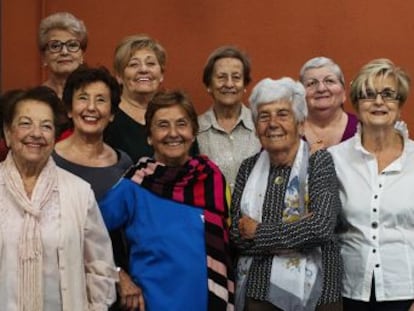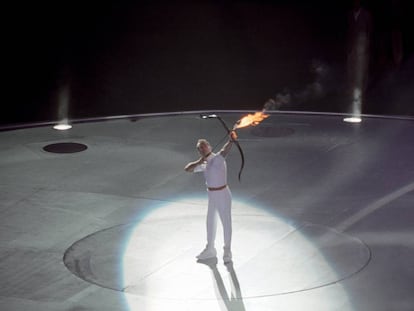Spanish female athletes: From obscurity to stardom in just 25 years
Since the 1992 Olympics, women have managed to claim their own place among the international elite

“Women dedicating their lives to sports is just inconceivable here.” That was Spanish golf champion Marta Figueras, speaking back in 1984. At the time, she formed part of the 1% of female Spaniards who had broken with tradition and practiced sports. She was joined by the skier Blanca Fernández Ochoa, who got the best result of any Spanish woman in the 1984 Winter Olympics in Sarajevo, winning sixth place in the Grand Slalom.
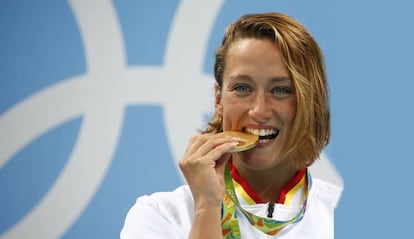
But on the whole, women’s achievements were modest and sporadic in Spain, because of the almost complete lack of physical education or sporting culture for this half of the population. Until 1964, girls were not even allowed to compete in the Spanish Athletic Championships. And until 1968, no female reached an Olympic final.
The team leader said, ‘I have nothing to say to you. You are all just tits and ass
The first to do so was Mari Paz Corominas, who came seventh in the 200m backstroke in Mexico. And as far as athletics were concerned, it was 1976 before Carmen Valero became the first female to compete, which she did at the Montreal Olympics. The stigma persisted throughout the 1970s, albeit to a lesser degree. “At that time in Spain a woman wearing a tracksuit was considered a tomboy,” says the high jumper Sagrario Aguado.
But over the last 25 years – from the ‘Ippon’ achieved by Miriam Blasco in Judo at the ’92 Barcelona Games to swimmer Mireia Belmonte’s triumph at the FINA World Championships in Budapest last Thursday – Spanish women have proved a force to be reckoned with.
Barcelona was undoubtedly a milestone. The day that Blasco beat Briton Nicola Fairbrother to become the first Spanish woman to win an Olympic medal, Spanish sportswomen entered a new era. Of the 22 medals that Spain won in Barcelona, eight went to women. Since then, Spanish women have won 49 Olympic medals, trumping the men in the last two Olympics with 11 of the 17 in London in 2012 and nine of the 17 in Rio de Janeiro. Four of the nine in Rio were gold, and went to high jumper Ruth Beitia, swimmer Mireia Belmonte, badminton player Carolina Marín and canoeist Maialen Chorraut.
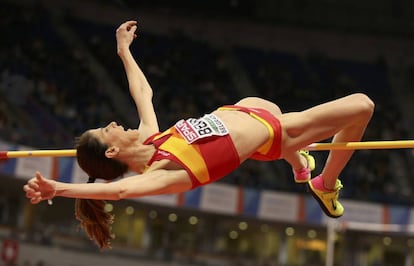
There were other signs in 1992 that Spanish women were gaining ground and ready to triumph in the international sporting arena. Skiier Blanca Fernández Ochoa was the first Spanish woman to step up to the podium that year, receiving bronze in France, while the Spanish female basketball team Dorna Godella won the European Championships.
Middle-distance runner Carmen Valero, who was world champion in 1976 and 1977, describes what female sports were like at the time. “There were a lot of differences between the boys and girls,” she says. “In Barcelona ’92, things changed a bit. But the change has been gradual. We have had to fight hard. Julio Bravo, the team leader when I ran in the World Championships in 1976, was pathetic. The night before the race he told us, ‘I have nothing to say to you. You are all just tits and ass. Whatever you do will be fine.’ And when I won, I said, ‘So, with the tits and ass… Now what?’ How can sports function properly with people like that?”
The number of women making a career in sports since 1992 has soared
“Suffice to say that when I began sailing, there were no women’s changing rooms,” explains Theresa Zabell, who won gold for sailing with Patricia Guerra in Barcelona 1992 and with Begoña Vía Dufresne in Atlanta in 1996. “I’ve experienced Spanish sportswomen’s struggle firsthand, both as a competitor and at an executive level. When I was younger, I wanted to compete but there was no budget for women. As we were not included in the Olympic program, there was no money allocated to female sailing. I was the Spanish champion in the European league and I got to go to the World Championships thanks to support from my club and my local council, but not from the Federation. That’s how far we’ve come.”
The number of women making a career in sports since 1992 has soared. Just after the Barcelona Olympics, there were 300,000; now there are more than 700,000, a figure that still only accounts for 21% of Spanish competitors.
In 2016, 44,123 women were registered by the soccer Federation – double that of 2012
After the millennium, a number of outstanding female champions emerged such as Arantxa Sánchez Vicario and Conchita Martínez, Joane Somarriba, Isabel Fernández, Miriam Blasco, Marta Domínguez, Theresa Zabell, Sheila Herrero, Gemma Mengual, Amaya Valdemoro, María Vasco, Carolina Ruiz, Ruth Beitia, Laia Sanz, Ona Carbonell, Carolina Marín, Marina Alabau, Lidia Valentín, Alba Torrens, Anna Cruz, Gisela Pulido and Garbiñe Muguruza.
In team sports, women have come to the fore in basketball, taking silver in the World Championships in 2014 and gold in the European Championships in 2013 and 2017. In water polo, they bagged gold in the 2013 World Championships and the 2014 European Championships, and also took silver in the 2012 Olympics and in the recent World Championships in Budapest.
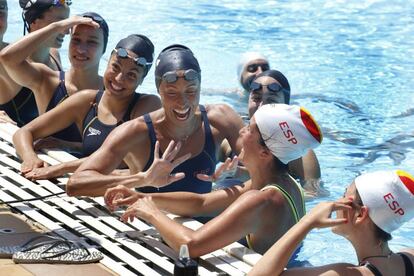
The rhythmic gymnastics team won silver in Rio and the handball team won bronze in the 2011 World Championships and the 2012 Olympics. Meanwhile, this year has seen women’s soccer thrive. In 2016, 44,123 women were registered by the Federation – double that of 2012.
There’s still a long way to go, and plenty still to be done, such as strengthening the leagues and seeing more female directors and top-flight coaches. But the leap already taken has put Spanish women firmly on the sporting map.
English version by Heather Galloway.
